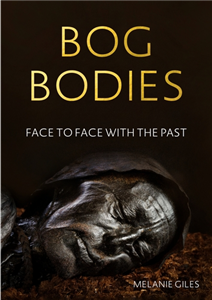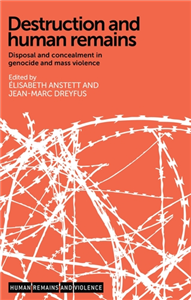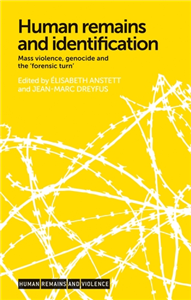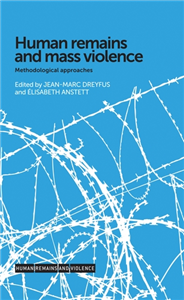Your Search Results
-
Manilla Press
Manilla Press is a home for novelists, journalists, memoirists, thinkers, dreamers, influencers. Our reach is international, our range broad, we publish with focus, passion and conviction, and we seek to find and publish underrepresented voices.
View Rights Portal
-
Promoted ContentHumanities & Social SciencesDecember 2020
Bog bodies
Face to face with the past
by Melanie Giles
The 'bog bodies' of north-western Europe have captured the imaginations of poets and archaeologists alike, allowing us to come face-to-face with individuals from the past. Their exceptional preservation permits us to examine minute details of their lives and deaths, making us reflect poignantly on our own mortality. But, as this book argues, the bodies must be resituated within a turbulent world of endemic violence and change. Reinterpreting the latest continental research and new discoveries, and featuring a ground-breaking 'cold case' forensic study of Worsley Man, Manchester Museum's 'bog head', it brings the bogs to life through both natural history and folklore, revealing them as places that were rich and fertile yet dangerous. The book also argues that these remains do not just pose practical conservation problems but also philosophical dilemmas, compounded by the critical debate on if - and how - they should be displayed.
-
Promoted ContentGenocide & ethnic cleansingMay 2017
Destruction and human remains
Disposal and concealment in genocide and mass violence
by Series edited by Jean-Marc Dreyfus, Élisabeth Anstett. Edited by Élisabeth Anstett, Jean-Marc Dreyfus
Destruction and human remains investigates a crucial question frequently neglected in academic debate in the fields of mass violence and genocide studies: what is done to the bodies of the victims after they are killed? In the context of mass violence, death does not constitute the end of the executors' work. Their victims' remains are often treated and manipulated in very specific ways, amounting in some cases to true social engineering, often with remarkable ingenuity. To address these seldom-documented phenomena, this volume includes chapters based on extensive primary and archival research to explore why, how and by whom these acts have been committed through recent history. Interdisciplinary in scope, Destruction and human remains will appeal to readers interested in the history and implications of genocide and mass violence, including researchers in anthropology, sociology, history, politics and modern warfare.
-
 Trusted Partner
Sociology: death & dyingMay 2017
Trusted Partner
Sociology: death & dyingMay 2017Human remains and identification
Mass violence, genocide, and the ‘forensic turn’
by Series edited by Jean-Marc Dreyfus, Élisabeth Anstett. Edited by Élisabeth Anstett, Jean-Marc Dreyfus
Human remains and identification presents a pioneering investigation into the practices and methodologies used in the search for and exhumation of dead bodies resulting from mass violence. Previously absent from forensic debate, social scientists and historians here confront historical and contemporary exhumations with the application of social context to create an innovative and interdisciplinary dialogue, enlightening the political, social and legal aspects of mass crime and its aftermaths. Through a ground-breaking selection of international case studies, Human remains and identification argues that the emergence of new technologies to facilitate the identification of dead bodies has led to a "forensic turn", normalising exhumations as a method of dealing with human remains en masse. However, are these exhumations always made for legitimate reasons? Multidisciplinary in scope, this book will appeal to readers interested in understanding this crucial phase of mass violence's aftermath, including researchers in history, anthropology, sociology, forensic science, law, politics and modern warfare. The research program leading to this publication has received funding from the European Research Council under the European Union's Seventh Framework Programme (FP/2007-2013) / ERC Grant Agreement n° 283-617.
-
 Trusted Partner
Humanities & Social SciencesDecember 2014
Trusted Partner
Humanities & Social SciencesDecember 2014Human remains and mass violence
Methodological approaches
by Jean-Marc Dreyfus, Élisabeth Anstett, Jean-Marc Dreyfus, Élisabeth Anstett
This book outlines for the first time in a single volume the theoretical and methodological tools for a study of human remains resulting from episodes of mass violence and genocide. Despite the highly innovative and contemporary research into both mass violence and the body, the most significant consequence of conflict - the corpse - remains absent from the scope of existing research. Why have human remains hitherto remained absent from our investigation, and how do historians, anthropologists and legal scholars, including specialists in criminology and political science, confront these difficult issues? By drawing on international case studies including genocides in Rwanda, the Khmer Rouge, Argentina, Russia and the context of post-World War II Europe, this ground-breaking edited collection opens new avenues of research. Multidisciplinary in scope, this volume will appeal to readers interested in an understanding of mass violence's aftermath, including researchers in history, anthropology, sociology, law, politics and modern warfare. ;
-
 Trusted Partner
Humanities & Social SciencesMarch 2017
Trusted Partner
Humanities & Social SciencesMarch 2017Human remains and mass violence
Methodological approaches
by Jean-Marc Dreyfus, Jean-Marc Dreyfus, Élisabeth Anstett, Élisabeth Anstett
This book outlines for the first time in a single volume the theoretical and methodological tools for a study of human remains resulting from episodes of mass violence and genocide. Despite the highly innovative and contemporary research into both mass violence and the body, the most significant consequence of conflict - the corpse - remains absent from the scope of existing research. Why have human remains hitherto remained absent from our investigation, and how do historians, anthropologists and legal scholars, including specialists in criminology and political science, confront these difficult issues? By drawing on international case studies including genocides in Rwanda, the Khmer Rouge, Argentina, Russia and the context of post-World War II Europe, this ground-breaking edited collection opens new avenues of research. Multidisciplinary in scope, this volume will appeal to readers interested in an understanding of mass violence's aftermath, including researchers in history, anthropology, sociology, law, politics and modern warfare. The research program leading to this publication has received funding from the European Research Council under the European Union's Seventh Framework Programme (FP/2007-2013) / ERC Grant Agreement n° 283-617.
-
 Trusted Partner
Society & culture: generalMay 2017
Trusted Partner
Society & culture: generalMay 2017Human remains and mass violence
Methodological approaches
by Edited by Jean-Marc Dreyfus, Élisabeth Anstett
This book outlines for the first time in a single volume the theoretical and methodological tools for a study of human remains resulting from episodes of mass violence and genocide. Despite the highly innovative and contemporary research into both mass violence and the body, the most significant consequence of conflict - the corpse - remains absent from the scope of existing research. Why have human remains hitherto remained absent from our investigation, and how do historians, anthropologists and legal scholars, including specialists in criminology and political science, confront these difficult issues? By drawing on international case studies including genocides in Rwanda, the Khmer Rouge, Argentina, Russia and the context of post-World War II Europe, this ground-breaking edited collection opens new avenues of research. Multidisciplinary in scope, this volume will appeal to readers interested in an understanding of mass violence's aftermath, including researchers in history, anthropology, sociology, law, politics and modern warfare. The research program leading to this publication has received funding from the European Research Council under the European Union's Seventh Framework Programme (FP/2007-2013) / ERC Grant Agreement n° 283-617.
-
 Trusted Partner
Humanities & Social SciencesFebruary 2025
Trusted Partner
Humanities & Social SciencesFebruary 2025Missing persons, political landscapes and cultural practices
Violent absences, haunting presences
by Laura Huttunen
This book examines human disappearances anthropologically in various contexts, ranging from enforced disappearances under oppressive governments and during armed conflicts to disappearing undocumented migrants and, finally, to people who go missing under more everyday circumstances. Two focuses run through the book: the relationship between the state and disappearances, and the consequences of disappearances for the families and communities of missing persons. The book analyses both the circumstances that make some people disappear and the variety of responses that disappearances give rise to; the latter include projects focused on searching for the missing and identifying human remains, as well as political projects that call for accountability for disappearances. While providing empirical examples from a variety of places, with Bosnia-Herzegovina as they key empirical site, the book develops an analytic grip on the slippery category of the 'disappeared'.
-
 Trusted Partner
Humanities & Social SciencesJuly 2015
Trusted Partner
Humanities & Social SciencesJuly 2015Human remains and identification
by Edited by Élisabeth Anstett and Jean-Marc Dreyfus
-
 Trusted Partner
Genocide & ethnic cleansingJanuary 2015
Trusted Partner
Genocide & ethnic cleansingJanuary 2015Destruction and human remains
by Edited by Élisabeth Anstett and Jean-Marc Dreyfus
-
 Trusted Partner
Humanities & Social SciencesMarch 2017
Trusted Partner
Humanities & Social SciencesMarch 2017Human remains and identification
by Jean-Marc Dreyfus, Élisabeth Anstett, Jean-Marc Dreyfus, Élisabeth Anstett
-
 Trusted Partner
Humanities & Social SciencesMarch 2017
Trusted Partner
Humanities & Social SciencesMarch 2017Destruction and human remains
by Jean-Marc Dreyfus, Élisabeth Anstett, Jean-Marc Dreyfus, Élisabeth Anstett
-
 Trusted Partner
Humanities & Social SciencesDecember 2017
Trusted Partner
Humanities & Social SciencesDecember 2017Human remains in society
by David Anderson, Paul J Lane, Zuzzana Dziuban, Vilho Shigedha, Caroline Sturdy Colls, David Deutsch, Devlin M. Scofield, John Harris, Gaetano Dato, Ayala Maurer-Prager, Jean-Marc Dreyfus, Élisabeth Anstett, Jean-Marc Dreyfus, Élisabeth Anstett
-
 Trusted Partner
Society & culture: generalFebruary 2015
Trusted Partner
Society & culture: generalFebruary 2015Human remains and mass violence
by Edited by Élisabeth Anstett and Jean-Marc Dreyfus
-
 Trusted Partner
Humanities & Social SciencesApril 2025
Trusted Partner
Humanities & Social SciencesApril 2025Islamophobia, anti-racism and the British left
by Scarlet Harris
Islamophobia is one of the most misunderstood and pernicious forms of racism in Britain. But how do those committed to challenging Islamophobia understand it? And what does this mean for their practices 'on the ground'? Islamophobia, anti-racism and the British left combines first-hand accounts from activists and community workers across two British cities with sociological theory, critically interrogating Islamophobia's relationship to 'race', racial capitalism and other modalities of racism. Setting this discussion against some of the most pertinent political shifts in Britain in recent years - from the resurgence of left nationalism to Black Lives Matter - the book assesses the limits of recent attempts to think about and tackle Islamophobia, and considers the possibilities of an alternative approach from and for the anti-racist left.
-
 Trusted Partner
Trusted Partner
-
 Trusted Partner
Humanities & Social SciencesApril 2022
Trusted Partner
Humanities & Social SciencesApril 2022The European Left and the financial crisis
by Michael Holmes, Knut Roder
-
 Trusted Partner
Trusted Partner
-
 Trusted Partner
June 2010
Trusted Partner
June 2010Muhammad Ali
by Peter Kemper
»Ich werde das Boxen nicht vermissen, aber das Boxen wird mich vermissen.« Nicht zufällig hat man Cassius Clay alias Muhammand Ali als »fünften Beatle« bezeichnet. Zusammen mit den Liverpooler Musikern stellte er sich an die Spitze jener sozialen und kulturellen Umbruchbewegung, die alle westlichen Länder in den Sechzigern erschüttern sollte. Seine Kombination aus Trotz und Witz veränderte den Sound der Zeit. Gleichermaßen eloquent und unverfroren, immer angriffslustig und mit einem schier unerschöpflichen Repertoire an Ausdrucksformen, brachte sich Ali als erster Popstar des Sports auf die internationale Bühne, um dort ethnische, religiöse und politische Tabus leichthändig zu verhandeln. Sein beinahe schwereloser Stil veränderte den Boxsport, seine kompromisslose Haltung schockierte die Welt.
-
 Trusted Partner
November 2011
Trusted Partner
November 2011Ali und Ramazan
Roman
by Perihan Magden, Johannes Neuner
Ali und Ramazan wachsen zusammen in einem Waisenhaus in Istanbul auf. Aus der spontanen Zuneigung entwickelt sich eine Liebe ebenso zärtlich wie grausam. Als sie mit 18 Jahren in eine ungewisse Zukunft entlassen werden, gibt ihnen nur diese Liebe Kraft. Doch der Traum vom Glück zu zweit währt nicht lang. Ramazan, der für beider Unterhalt sorgt, gleitet ab in die Welt der Stricher, während Ali seine Eifersucht mit Drogen und dem Schnüffeln von Lösungsmitteln betäubt. Eine Katastrophe bahnt sich an … Der neue Roman der türkischen Bestseller-Autorin: eine dramatische schwule Liebesgeschichte aus dem modernen Istanbul, beruhend auf einer wahren Begebenheit. Erschütternd, ergreifend und packend.
-
 Trusted Partner
Humanities & Social SciencesFebruary 2024
Trusted Partner
Humanities & Social SciencesFebruary 2024The material body
by Elizabeth Craig-Atkins, Karen Harvey




























